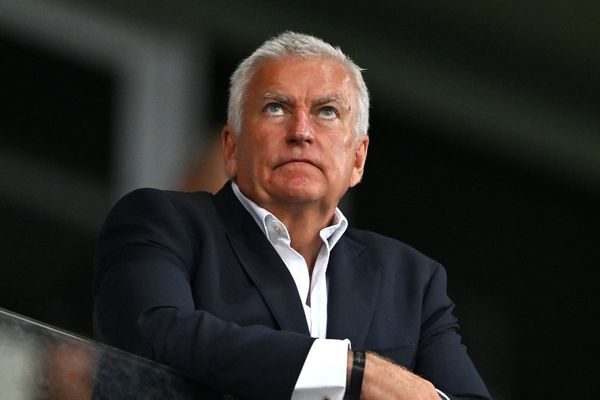
The Rugby Football Union chief executive, Bill Sweeney, was paid a staggering £1.1m for the 2023-24 financial year despite record losses and swingeing job cuts at the governing body.
Sweeney’s basic salary rose from £684,000 to £742,000 – an increase of 8.5% – and he was awarded £358,000 as part of a long-term incentive plan linked to the union’s post‑Covid recovery, for the year ending June 2024.
That Sweeney became the first RFU chief executive to be paid a seven-figure salary amid an overall loss to reserves of £42m, according to the RFU’s latest accounts released on Monday, and 42 redundancies has been met with widespread disbelief within the game. The RFU, meanwhile, has pointed to fewer home matches because of the 2023 World Cup – and the added expense of the tournament – as key reasons for the losses.
Sweeney’s additional payment of £358,000 – effectively a bumper bonus – came because the RFU’s remuneration committee agreed three years ago that the executive team would be signed up for a long‑term incentive plan, that would be realised after three years, having taken a six‑month pay cut during the Covid pandemic.
In September the RFU announced that 42 employees were being made redundant after being hit by “rising utilities, travel, and operating costs” just weeks after announcing the £100m sale of the Twickenham naming rights to Allianz.
“The long-term incentive plan was recommended and approved by the RFU board and the remuneration committee in recognition for the need to retain a strong and stable executive team in place to cover what has been an incredibly challenging three-year period,” the RFU chair, Tom Ilube, said.
“During the pandemic, the executive team took deeper and longer salary cuts than the rest of the organisation along with a reduced bonus. The [long-term incentive plan] put in place post‑Covid, recognised the material and voluntary reduction in remuneration, despite an exceptional increase in workload, while also incentivising the executive team to remain in post to deliver against challenging multiyear targets.”
Sweeney has insisted the RFU has been “well planned” for such losses but his pay rise increase jars with the financial picture painted by the latest accounts. He was appointed in 2019 and has proven adept at riding storms, having faced down a rebellion from council members on the eve of the 2023 World Cup, while he has survived the demise of Worcester, Wasps, London Irish and Jersey Reds on his watch.
He also presided over the furore around the decision to lower the tackle height in the amateur game which led to calls for a vote of no confidence. Two years ago, he sacked Eddie Jones – England’s most successful head coach by win percentage – and installed Steve Borthwick. Under Borthwick, England won only five of their 12 matches in 2024. More recently, he has come under fire amid allegations about the environment Jones ran when he was head coach.
Sweeney said: “The RFU has planned well for this year, the fourth year in our business planning cycle, which is always loss-making due to increased costs associated with going to the Rugby World Cup and as a result of hosting fewer games at Allianz Stadium.
“Emerging from post-Covid challenges, which saw significant lost revenues, substantial increases in costs and inflation, and a drop in player participation, we are now entering into a period of significant transformation with a great deal to be positive about.
“While the Autumn Nations Series’ results have been disappointing, we are encouraged by the pipeline of talented young players coming through and the outstanding England win in the World Rugby U20 Championship final against France, taking the title for the first time in eight years.”
The RFU has announced an operating loss of £37.9m – after a £4m profit the previous year – with a £53.8m decline in year‑on‑year revenue. Taking into account taxation and adjusting for minority interests, the loss to reserves was £42m. No autumn fixtures in 2023 and fewer Six Nations matches meant £25.4m less from ticket sales, £22m less received for catering and hospitality, and a £6.4m drop in broadcast revenues. The outgoing chief financial officer, Sue Day, points to a healthy reserve but states that is driven largely by the windfall from CVC via their investment into the Six Nations.
“Both the organisation itself and the entire rugby system in this country have, over the last few years, been through some challenging financial times and we have all worked hard to steer a course through those challenges,” Day writes. “There remains, of course, much to do but it is also important to emphasise that we are now in a strong and resilient financial position as a result of that work.”










